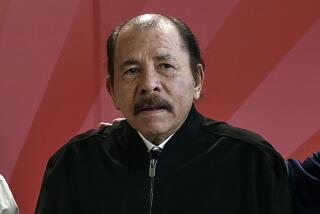Red Cross issues sharp rebuke to Myanmar junta
- Share via
GENEVA — The International Committee of the Red Cross, in a rare public censure Friday, accused Myanmar’s ruling junta of committing serious abuses against detainees and civilians.
The Swiss-based organization, which normally deals confidentially with governments, said thousands of prisoners in the country, also known as Burma, were being forced to work as porters for the military in degrading and dangerous conditions.
People living near Myanmar’s border with Thailand also have been subjected to systematic rights violations, the Red Cross said, citing reports of soldiers destroying villages’ food stocks, forcing people from their homes, making arbitrary arrests and committing violence, including killings.
Government officials “have consistently refused to enter into a serious discussion of these abuses with a view to putting a stop to them,” Red Cross President Jakob Kellenberger said.
“The continuing deadlock with the authorities has led the ICRC to take the exceptional step of making its concerns public,” Kellenberger said.
The Red Cross, mandated to monitor compliance with international humanitarian law, including the 1949 Geneva Convention, rarely makes such denunciations. Over the last 20 years it has aired concerns over abuses in Zimbabwe, Iran, Iraq, Bosnia, Rwanda and Israel.
Kellenberger said restrictions in Myanmar, which has been under military rule since 1962, have made it impossible for Red Cross staff members to move around independently and hampered the delivery of aid meant for humanitarian purposes.
The organization has been unable since late 2005 to visit any of Myanmar’s estimated 1,100 political prisoners because authorities have not allowed it to conduct interviews privately, insisting that government-affiliated agencies also be present.
Red Cross staff members have not visited detained opposition leader and Nobel peace laureate Aung San Suu Kyi, 62, since September 2003.
Suu Kyi, whose house arrest was extended in May for another year despite international pleas for her freedom, has been confined for nearly 12 of the last 18 years.
More to Read
Sign up for Essential California
The most important California stories and recommendations in your inbox every morning.
You may occasionally receive promotional content from the Los Angeles Times.










